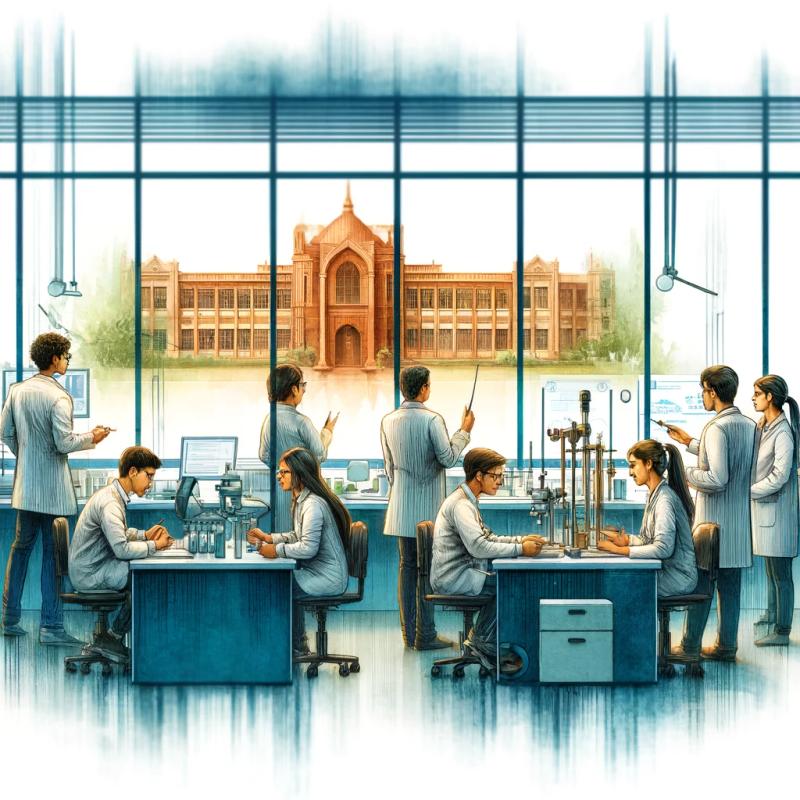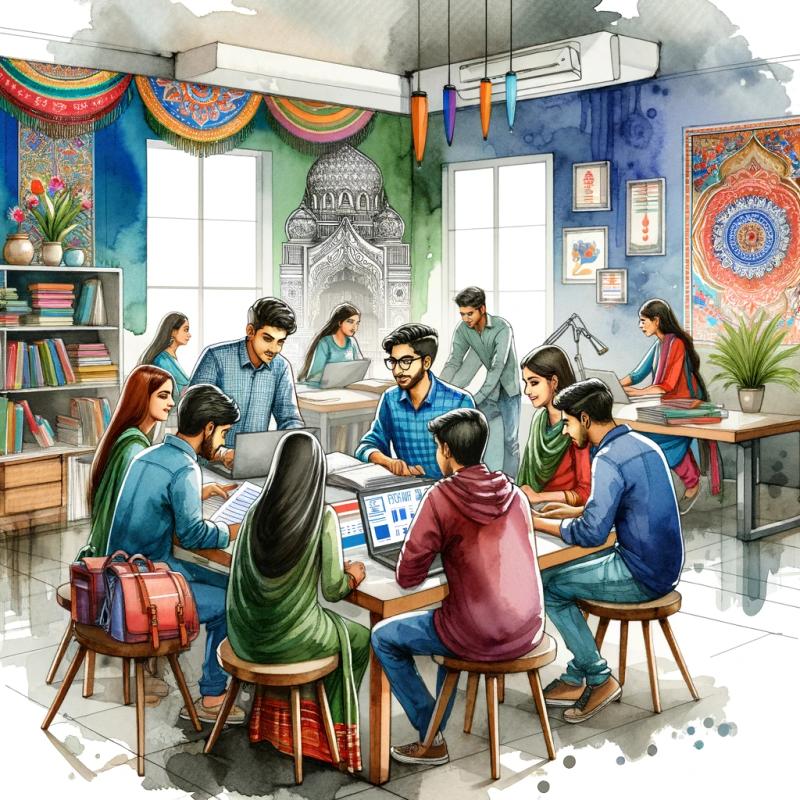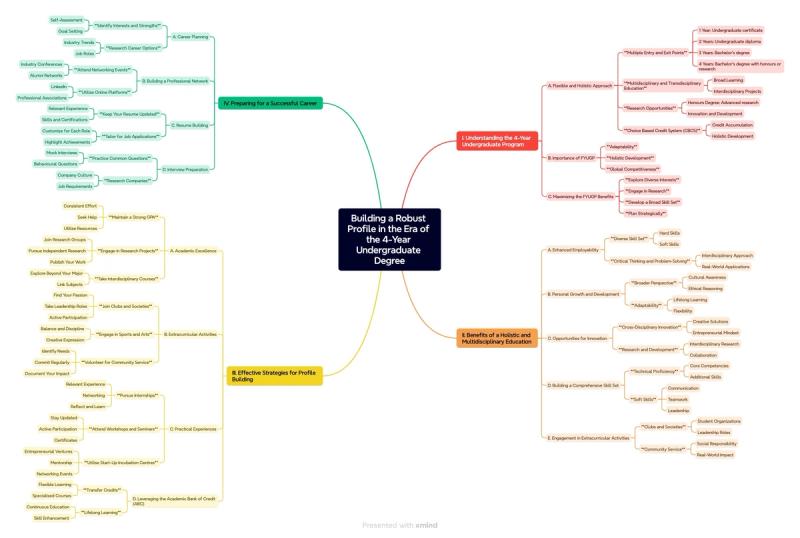Building a Robust Profile in the Era of the 4-Year Undergraduate Degree
 Kiran Mohan Vazhapully
Kiran Mohan Vazhapully
The University Grants Commission (UGC) finalised the framework for the new education policy’s 4-year graduation/undergraduate program (FYUGP) last year, adopted by higher education institutions starting the academic session 2023-2024. All 45 central universities and most state and private universities offer this new four-year curriculum. The UGC’s new regulations for the FYUGP will be distributed to all universities nationwide.
I. Understanding the 4-Year Undergraduate Program
The NEP 2020 has introduced the 4-year undergraduate program (FYUGP) to create a more flexible and multidisciplinary education system that caters to the diverse needs of today’s students. This program is designed to provide a comprehensive education that not only focuses on academic excellence but also on employability skills and holistic development. Let’s explore the key features and benefits of this new structure.
A Flexible and Holistic Approach
The FYUGP is not just an extension of the traditional three-year degree; it’s a significant transformation in how higher education is delivered. Here are some key elements and their implications:
1. Multiple Entry and Exit Points:
- 1 Year: Undergraduate certificate.
- 2 Years: Undergraduate diploma.
- 3 Years: Bachelor’s degree.
- 4 Years: Bachelor’s degree with honours or research.
This flexibility allows students to tailor their education to their needs and circumstances. For instance, a student can exit after two years with a diploma if they need to start working but can also re-enter the program later to complete their degree.
2. Multidisciplinary and Transdisciplinary Education:
- -Broad Learning: Encourages students to take courses across various disciplines, promoting a well-rounded education.
- -Interdisciplinary Projects: Engages students in projects that integrate knowledge from different fields, fostering innovative thinking and problem-solving.
By studying a mix of subjects, students develop a broader perspective, which is highly valued in today’s job market. This approach equips them with diverse skills and knowledge, making them more adaptable and employable.
3. Research Opportunities:
- Honours Degree: The fourth year is dedicated to advanced research, allowing students to gain deep expertise in their chosen field.
- Innovation and Development: Participating in research projects helps students develop critical thinking, analytical skills, and a hands-on understanding of their subject.
Research experience can be a significant advantage for students aiming for careers in academia, research, or any field that values analytical and problem-solving skills.
4. Choice Based Credit System (CBCS):
- Credit Accumulation: The new CBCS framework allows students to accumulate credits from various institutions, facilitating flexible learning paths.
- Holistic Development: The curriculum includes courses on value-based education, environmental education, and community service, ensuring holistic development.
This system is designed to support continuous and flexible learning, making it easier for students to pursue additional qualifications or switch fields without starting from scratch.
Why is this Important?
The FYUGP aligns with global educational standards and prepares students for the complexities of the modern world. Here’s why it matters:
- Adaptability: The program’s flexibility and broad curriculum make students more adaptable to different roles and industries.
- Holistic Development: Emphasis on multidisciplinary learning, research, and soft skills ensures students are well-rounded individuals ready to face various professional and personal challenges.
- Global Competitiveness: The comprehensive education provided by the FYUGP prepares Indian students to compete effectively on a global stage.
How Can Students Make the Most of It?
To maximise the benefits of the FYUGP, students should:
- Explore Diverse Interests: Take advantage of the flexible curriculum to explore different subjects and find what truly interests you.
- Engage in Research: Use the fourth year to engage in meaningful research projects, which can provide a significant advantage in higher education and the job market.
- Develop a Broad Skill Set: Enroll in courses that develop technical and soft skills, such as communication, leadership, and critical thinking.
- Plan Strategically: Use the multiple entry and exit points to plan your education according to your career goals and personal circumstances.

II. Benefits of a Holistic and Multidisciplinary Education
Continuing from the innovative structure of the 4-year undergraduate program, let’s delve into the significant benefits that a holistic and multidisciplinary education offers. This approach is designed to equip students with a diverse skill set and broad knowledge base, preparing them for the complexities of the modern world. Here’s how this educational paradigm can profoundly impact students' personal and professional growth.
Enhanced Employability
In today’s dynamic job market, employers are not just looking for subject-matter experts but also for individuals who can bring diverse perspectives and skills to the table. Here’s how a multidisciplinary education boosts employability:
1. Diverse Skill Set:
- Hard Skills: Students gain technical expertise across various domains, making them versatile candidates for multiple roles.
- Soft Skills: Engagement in different disciplines enhances communication, leadership, and teamwork abilities.
For example, a student majoring in engineering who also studies business management can bridge the gap between technical and managerial roles, making them an asset in technology-driven companies.
2. Critical Thinking and Problem-Solving:
- Interdisciplinary Approach: Studying multiple subjects helps students approach problems from different angles, fostering innovative solutions.
- Real-World Applications: The integration of theoretical knowledge with practical applications prepares students to tackle real-world challenges effectively.
Employers highly value the ability to think critically and solve complex problems, skills nurtured through a multidisciplinary curriculum.
Personal Growth and Development
Beyond academic and professional benefits, a holistic education plays a crucial role in personal development:
1. Broader Perspective:
- Cultural Awareness: Exposure to humanities and social sciences broadens students' understanding of different cultures and societal issues.
- Ethical Reasoning: Courses in philosophy and ethics help students develop a solid moral compass and ethical decision-making skills.
This broader perspective is essential for personal growth and helps students become well-rounded individuals.
2. Adaptability:
- Lifelong Learning: The habit of learning across disciplines encourages continuous personal and professional development.
- Flexibility: The ability to adapt to various roles and industries makes students more resilient in the face of career changes.
In a world where job roles and industries are constantly evolving, adaptability is a key trait for long-term success.
Opportunities for Innovation
A multidisciplinary education fosters a culture of innovation and creativity:
1. Cross-Disciplinary Innovation:
- Creative Solutions: Combining knowledge from different fields leads to unique and creative solutions to problems.
- Entrepreneurial Mindset: Understanding various aspects of business, technology, and society encourages entrepreneurial thinking and innovation.
Students are better equipped to create and lead startups, drive innovation in established companies, or contribute to groundbreaking research.
2. Research and Development:
- Interdisciplinary Research: Students engage in research projects spanning multiple disciplines, contributing to significant field advancements.
- Collaboration: Collaborative projects with peers from different backgrounds enhance learning and lead to innovative outcomes.
Participating in interdisciplinary research projects enhances critical thinking and problem-solving abilities while contributing to academic and industry advancements.
Building a Comprehensive Skill Set
The multidisciplinary approach ensures that students develop a comprehensive skill set, which includes:
1. Technical Proficiency:
- Core Competencies: Mastery of core subjects in their major.
- Additional Skills: Knowledge of complementary disciplines such as data science, artificial intelligence, or environmental science.
This diverse skill set makes students more competitive and versatile in the job market.
2. Soft Skills:
- Communication: Effective written and verbal communication skills developed through humanities and social science courses.
- Teamwork: Collaboration on projects and participation in extracurricular activities enhance teamwork skills.
- Leadership: Opportunities to lead clubs, societies, and projects build leadership capabilities.
Employers look for candidates who can effectively communicate, collaborate, and lead, making these soft skills invaluable.
Engagement in Extracurricular Activities
Extracurricular activities are an integral part of the holistic educational experience:
- Clubs and Societies:
- Student Organizations: Participation in clubs related to various interests, such as technology, arts, or social service, provides practical experience and networking opportunities.
- Leadership Roles: Taking on leadership positions in these organizations helps develop management and organizational skills.
Being active in clubs and societies demonstrates initiative and leadership potential, qualities highly regarded by employers.
2. Community Service:
- Social Responsibility: Involvement in community service projects cultivates empathy and a sense of social responsibility.
- Real-World Impact: Applying classroom knowledge to solve real-world problems through community service enhances learning and personal satisfaction.
Community service activities highlight a commitment to societal betterment and ethical conduct, adding depth to a student’s profile.

III. Effective Strategies for Profile Building
Building a strong profile during your undergraduate years is crucial for shaping a successful career. With the flexibility and interdisciplinary focus of the 4-year undergraduate program introduced by NEP 2020, students have unique opportunities to create a standout profile. Here are actionable and clear guidelines to help you make the most of your undergraduate journey.
1. Academic Excellence
Achieving academic excellence is the foundation of a strong profile. Here’s how you can ensure top academic performance:
Maintain a Strong GPA:
- Consistent Effort: Aim for consistently high grades by staying disciplined and managing your study schedule effectively.
- Seek Help: Don’t hesitate to ask for help from professors, teaching assistants, or peers if you’re struggling with a subject.
- Utilize Resources: Make use of library resources, online courses, and study groups to enhance your learning.
Engage in Research Projects:
- Join Research Groups: Connect with faculty members who are working on research projects related to your interests.
- Pursue Independent Research: If possible, propose and conduct your own research projects. This demonstrates initiative and deep engagement with your field.
- Publish Your Work: Aim to publish your research in academic journals or present at conferences. This adds significant value to your profile.
Take Interdisciplinary Courses:
- Explore Beyond Your Major: Enroll in courses outside your major to gain diverse knowledge and skills.
- Link Subjects: Look for connections between different subjects and how they can complement your primary field of study.
2. Extracurricular Activities
Involvement in extracurricular activities showcases your versatility and enhances your soft skills. Here are some tips:
Join Clubs and Societies:
- Find Your Passion: Identify clubs and societies that align with your interests, whether technology, arts, sports, or social service.
- Take Leadership Roles: Aim for leadership positions such as president, secretary, or project leader. This demonstrates your ability to manage and lead teams.
- Active Participation: Be an active member by organizing events, participating in competitions, and contributing to club activities.
Engage in Sports and Arts:
- Balance and Discipline: Participation in sports teaches discipline and teamwork. It also helps in maintaining physical fitness.
- Creative Expression: Engage in arts, music, dance, painting, or drama. This fosters creativity and emotional expression.
Volunteer for Community Service:
- Identify Needs: Look for community service opportunities that address local needs, such as teaching underprivileged children, environmental conservation, or health awareness campaigns.
- Commit Regularly: Regular involvement in community service demonstrates commitment and responsibility.
- Document Your Impact: Keep a record of your contributions and the impact of your work. This can be a powerful addition to your resume.

3. Practical Experiences
Gaining practical experience through internships, workshops, and projects is essential. Here’s how to do it effectively:
Pursue Internships:
- Relevant Experience: Look for internships in industries related to your field of study to gain relevant experience.
- Networking: Use internships to build professional networks. Connect with mentors, supervisors, and peers.
- Reflect and Learn: After each internship, reflect on what you’ve learned and how it contributes to your career goals.
Attend Workshops and Seminars:
- Stay Updated: Participate in workshops and seminars to stay updated with the latest trends and technologies in your field.
- Active Participation: Engage actively in these sessions by asking questions and participating in discussions.
- Certificates: Collect certificates of participation. These add value to your profile.
Utilise Start-Up Incubation Centres:
- Entrepreneurial Ventures: If you have a business idea, use your institution’s start-up incubation centre to develop it.
- Mentorship: Seek guidance from mentors and industry experts available at these centres.
- Networking Events: Participate in networking events organized by these centres to meet potential investors and collaborators.
4. Leveraging the Academic Bank of Credit (ABC)
The Academic Bank of Credit (ABC) system allows for a flexible and continuous learning path. Here’s how you can make the most of it:
Transfer Credits:
- Flexible Learning: Take advantage of the flexibility to transfer credits from different institutions to complete your degree.
- Specialised Courses: Enroll in specialised courses offered by other institutions not available at your primary institution.
Lifelong Learning:
- Continuous Education: Use the ABC system to continue your education even after graduation by taking new courses to stay updated with industry developments.
- Skill Enhancement: Regularly update your skills and knowledge base by accumulating credits over time.
5. Planning for a Successful Career
Strategic career planning is essential to ensure that all your efforts lead to a fulfilling career. Here’s how to plan effectively:
Career Goals:
- Identify Interests: Reflect on your interests and career aspirations. Use your undergraduate years to explore and solidify these goals.
- Set Milestones: Set short-term and long-term career milestones to keep yourself motivated and on track.
Build a Professional Network:
- Networking Events: Attend industry conferences, seminars, and networking events to connect with professionals.
- LinkedIn: Maintain an updated LinkedIn profile and connect with professionals in your field.
- Alumni Associations: Engage with your institution’s alumni network for mentorship and job opportunities.
Resume Building:
- Keep it Updated: Regularly update your resume with new skills, experiences, and achievements.
- Tailor for Jobs: Customize your resume for each job application to highlight the most relevant experiences and skills.
Interview Preparation:
- Practice Common Questions: Prepare for common interview questions and practice your answers.
- Research Companies: Before interviews, research the company thoroughly to understand its culture, values, and requirements.
- Mock Interviews: Participate in mock interviews to gain confidence and improve your interviewing skills.
IV. Leveraging the Academic Bank of Credit (ABC)
The Academic Bank of Credit (ABC) system introduced by the NEP 2020 is a game-changer for higher education in India. It allows students to accumulate and transfer credits across different recognized institutions, offering unparalleled flexibility and promoting lifelong learning. Here’s how to leverage the ABC system effectively to build a strong academic profile.
Understanding the ABC System
The ABC system is designed to facilitate seamless credit transfer, allowing students to:
- Accumulate Credits: Earn credits from various courses across different institutions.
- Store Credits: Securely store these credits in a digital format for future use.
- Transfer Credits: Transfer credits between institutions to complete degree requirements.
Benefits of the ABC System
1. Flexibility in Learning:
- Customize Your Degree: Tailor your education by choosing courses that align with your interests and career goals, even if they are offered by different institutions.
- Multiple Institutions: Take advantage of specialized courses from multiple institutions to broaden your knowledge base and skill set.
2. Lifelong Learning:
- Continuous Education: Use the ABC system to continue learning and updating your skills throughout your career.
- Re-entry to Education: If you need to take a break from your studies, the ABC system allows you to return and continue from where you left off without losing your earned credits.
3. Enhanced Career Opportunities:
- Skill Enhancement: Regularly update your skills by taking new courses and earning credits, making you more competitive in the job market.
- Networking: Engaging with different institutions can help you build a diverse professional network.

Actionable Steps to Leverage the ABC System
1. Plan Your Course Path:
- Identify Goals: Determine your career goals and identify the skills and knowledge you need to achieve them.
- Course Selection: Choose courses that align with these goals, even if they are offered by different institutions. Use the flexibility of the ABC system to customize your learning path.
2. Accumulate and Transfer Credits:
- Credit Tracking: Keep track of the credits you earn and ensure they are stored in the ABC system.
- Regular Updates: Regularly update your academic portfolio with new credits. This helps in showcasing your continuous learning and skill development.
3. Utilise Online and Hybrid Courses:
- Online Learning Platforms: Enroll in online courses from reputed institutions that offer credits recognized by the ABC system.
- Hybrid Learning: Combine online and offline learning to maximize the flexibility and convenience of your education.
4. Engage with Institutional Resources:
- Advisors and Mentors: Consult academic advisors and mentors to help you navigate the ABC system and make informed decisions about your education path.
- Institutional Collaborations: Take advantage of collaborations between institutions that allow for easier credit transfer and access to diverse courses.
5. Document and Showcase Your Achievements:
- Academic Portfolio: Maintain a comprehensive portfolio of your academic achievements, including all the credits you have accumulated and the courses you have completed.
- Certificates and Diplomas: Highlight the certificates, diplomas, and degrees you earn at various stages of your education.
Case Study: How ABC Can Enhance Your Profile
Imagine a student pursuing a degree in computer science who is also interested in digital marketing and entrepreneurship. Using the ABC system, the student can:
- Enroll in Core Courses: Complete core computer science courses at their home institution.
- Take Specialized Courses: Enroll in digital marketing courses from a reputed online platform and earn credits.
- Participate in Entrepreneurship Workshops: Attend workshops and seminars on entrepreneurship at another institution and accumulate these credits.
- Transfer and Combine Credits: Transfer all these credits back to their home institution to complete their degree requirements while also gaining a multidisciplinary skill set that makes them highly employable.
V. Preparing for a Successful Career
The holistic education and diverse experiences provided by the 4-year undergraduate program and the ABC system set a strong foundation for a successful career. Here’s how to prepare effectively:
1. Career Planning
Identify Interests and Strengths:
- Self-Assessment: Reflect on your interests, strengths, and career aspirations. Use tools like career assessment tests to gain insights.
- Goal Setting: Set short-term and long-term career goals. Break these down into achievable milestones.
Research Career Options:
- Industry Trends: Stay informed about industry trends and emerging fields. This helps in identifying promising career paths.
- Job Roles: Research different job roles within your field of interest to understand the skills and qualifications required.
2. Building a Professional Network
Attend Networking Events:
- Industry Conferences: Participate in industry conferences, seminars, and workshops to meet professionals and experts in your field.
- Alumni Networks: Engage with your institution’s alumni network. Alumni can provide valuable guidance and job opportunities.
Utilize Online Platforms:
- LinkedIn: Create and maintain an updated LinkedIn profile. Connect with professionals, join relevant groups, and participate in discussions.
- Professional Associations: Join professional associations related to your field. These organizations often provide networking events and career resources.
3. Resume Building
- Keep Your Resume Updated:
- Relevant Experience: Highlight relevant academic achievements, internships, projects, and extracurricular activities.
- Skills and Certifications: Include any additional skills, certifications, or courses completed through the ABC system.
Tailor for Job Applications:
- Customize for Each Role: Tailor your resume for each job application to emphasize the most relevant experiences and skills.
- Highlight Achievements: Focus on your accomplishments and the impact of your work, rather than just listing responsibilities.
4. Interview Preparation
Practice Common Questions:
- Mock Interviews: Participate in mock interviews to practice common questions and improve your confidence.
- Behavioural Questions: Prepare for behavioural questions by reflecting on past experiences and how they demonstrate your skills and competencies.
Research Companies:
- Company Culture: Understand the company’s culture, values, and mission. This helps in tailoring your responses to align with the company’s expectations.
- Job Requirements: Thoroughly review the job description to understand the skills and qualifications required.
VI. Conclusion
The 4-year undergraduate program and the Academic Bank of Credit system introduced by NEP 2020 offer students a wealth of opportunities to build a strong and versatile profile. By excelling academically, engaging in extracurricular activities, gaining practical experience, leveraging the ABC system, and strategically planning for their careers, students can set themselves up for long-term success. This holistic approach to education ensures graduates are well-rounded, adaptable, and ready to thrive in a rapidly evolving job market.

Related Posts

Inculcating the Habit of Reading

Being Happy while Studying: A Key to Unl...

From Orientation to Graduation: Transfor...

ആസൂത്രണം വേണം. ഉപരിപഠനത്തിനും കരിയറിനും...

